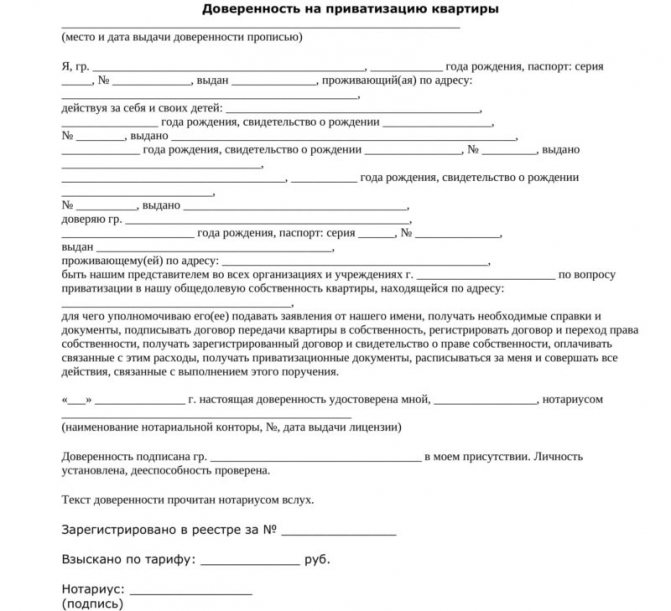Home / Housing disputes / Power of attorney for privatization of an apartment, housing
Privatization of a municipal apartment takes a lot of time and effort. Instead of doing everything themselves, many people draw up a notarized power of attorney for privatization. The representative indicated in it assumes responsibility for transferring the housing into private ownership. Legal actions are performed strictly in the interests of the principal, i.e. one who has issued a power of attorney and transferred part of his powers to another person.
The document is drawn up in accordance with the rules: the absence of a signature, details of the parties or a violation of the structure makes the power of attorney void. Therefore, problems may arise with privatization.
How to write a power of attorney for the privatization of an apartment? Does it need to be certified by a notary? What documents are needed for this? We will examine these and other pressing issues in our article.
In what cases is a power of attorney needed?
Privatization of municipal housing involves the participation of interested parties who are indicated in the social tenancy agreement and have rights to registration. Usually there are several such citizens: the employer and his family members. The apartment is transferred into ownership on the basis of shared ownership. The privatization agreement is signed by all parties to the transaction (see “Who has the right to privatize an apartment”).
But what if they don't have time for this or are unable to sign due to physical illness?
This is why a power of attorney exists - a document issued by the principal in the name of the attorney for the purpose of fulfilling legal obligations (Clause 1 of Article 185 of the Civil Code of the Russian Federation). One of the responsibilities is considered to be the privatization of an apartment in the interests of the principal. However, permits can be different: to drive a vehicle, to sign, to receive goods, to register with the traffic police, etc.
When can you issue a power of attorney for the privatization of housing:
- If there is a lack of time (for example, due to being busy at work);
- Being treated in a hospital (in case of illness);
- Stay in another city or abroad (work, study, vacation);
- Minor age.
Situations may be different, but the main ones are presented above. A separate power of attorney must be drawn up for each reason.
Example: A woman who is in the last months of pregnancy is participating in privatization.
If a woman in labor cannot personally collect documents and sign an agreement with the administration, she can write a power of attorney to a notary, lawyer, spouse or third parties. The reason is staying in the maternity hospital. If a man who is away due to rotational work participates in this privatization, he must draw up his permission - choose a representative and entrust him with conducting the privatization in his favor.
Legal requirements for the document

Is it possible to privatize an apartment by proxy? According to Article 185 , Part 1 of the Civil Code of the Russian Federation, a transaction for the privatization of housing is among the transactions that require a notarial form.
A document certified by a notary gives the right to an authorized person to act on behalf of a citizen in preparing and signing a privatization agreement.
A power of attorney is a two-sided document concluded between the Principal and the Proxy. According to the Law “On Privatization...” No. 1541-1, the principal can only be a citizen of the Russian Federation.
A power of attorney for privatization is a special document that has significant differences from other papers of the same type. For example, if parents have a power of attorney to carry out any actions on behalf of a child over 14 years old, then it will not be suitable for the privatization procedure.
It will be necessary to draw up a special form of paper listing the powers and government agencies to which the parent can apply.
Civil Code of the Russian Federation Article 185. General provisions on powers of attorney
- A power of attorney is a written authority issued by one person to another person or other persons for representation before third parties.
- Powers of attorney on behalf of minors (Article 28) and on behalf of incapacitated citizens (Article 29) are issued by their legal representatives.
- Written authority to carry out a transaction by a representative may be presented by the represented directly to the relevant third party, who has the right to verify the identity of the represented and make a note about this on the document confirming the authority of the representative.
- The rules of this Code on powers of attorney also apply in cases where the powers of the representative are contained in an agreement, including in an agreement between the representative and the represented, between the represented and a third party, or in a decision of the meeting, unless otherwise established by law or does not contradict the essence of the relationship.
- If a power of attorney is issued to several representatives, each of them has the powers specified in the power of attorney, unless the power of attorney stipulates that the representatives exercise them jointly.
- The rules of this article accordingly also apply in cases where a power of attorney is issued jointly by several persons.
Written authorization for a representative of a citizen to receive his deposit in a bank, to deposit funds into his deposit account, to carry out transactions on his bank account, including receiving funds from his bank account, as well as to receive correspondence addressed to him in a communications organization may be presented directly to the bank or telecommunications organization.
Be sure to read it! Cash discipline - cash balance limit for 2020
Documents for registration of a power of attorney
The main condition for issuing any type of power of attorney is the mutual desire of the participants. When going to the notary, be sure to take with you:
- principal's passport (original and copy);
- passport of the authorized person (you can limit yourself to only a copy).
Filling
The registration is carried out by a notary or lawyer. A specialist or owner can fill in the fields by hand in the presence of a notary.
Certification
The notary also does the certification. He puts his marks on the form. In addition to his signature, there must be a signature of the owner. It is acceptable to sign an attorney.
Form
Such permissions are filled out on a special form that the lawyer has. The data is entered by the owner or notary. No other forms are provided. The form must be certified and entered into the register. This is the responsibility of the notary. you can below.
Steps for registration
- Choosing an attorney. It is necessary to choose the responsible person carefully and carefully. Any competent adult who is a citizen of the Russian Federation can act as an attorney.
- Collection of documents. You will definitely need:
- Participants' passports. Copies of all pages may also be required. Sometimes only copies are enough, but some lawyers may refuse to file without the originals.
- Certificate of ownership or an extract from their Unified State Register.
- Choose a notary. Usually the price for services is approximately the same for all specialists, so when choosing, you should not rely on this criterion. It is more important that the specialist is “tested”. You need to read reviews and find the option closest to your home.
- Come to the office and fill out the form.
Note: Additional documents can be obtained from a specific lawyer, but usually these are sufficient.
In addition, you need to know the nuances of registration in order to independently check the form after issue.
Types of powers of attorney
There are several types of powers of attorney:
- One-time - involves performing a single operation in the interests of the principal (for example, submitting a package of documents for privatization to the Housing Services Department of the Ministry of Defense of the Russian Federation);
- Special – obliges the attorney to perform homogeneous legally significant acts (for example, request a certificate for transferring an apartment into private ownership);
- General (general) – empowers the trustee to carry out any actions related to the privatization of municipal housing.
There are other, less popular powers of attorney - with and without the right of substitution (Article 187 of the Civil Code of the Russian Federation). Example: delegating a number of functions to a lawyer or notary. Information about this is indicated in advance in the original document.
Is it possible to privatize an apartment using a general power of attorney?
Privatization requires applicants to perform several legal operations: collecting documents, drawing up applications, contacting the BTI, administration, Rosreestr, ordering a technical plan and many others. If you can submit a request yourself, but do not want to collect information, it is better to issue a special power of attorney. However, if you need to privatize an apartment, as they say, “from” and “to”, you can draw up a general document.
Expert opinion
Semyon Frolov
Lawyer. 7 years of experience. Specialization: family, inheritance, housing law.
The main difference between a general power of attorney and a one-time and special power of attorney is the legal powers of the attorney. The representative has the right to perform any actions, sign, and request documents. The duties of the trustee are specified in the general power of attorney. Lawyers advise not to limit yourself to a general formulation like “take action to privatize an apartment”, but to indicate specific responsibilities.
For example, an attorney undertakes...
- notify other privatization participants;
- prepare applications/notarial waivers;
- collect documents for an apartment, housing;
- submit an application to the administration;
- sign the real estate transfer agreement, etc.
This makes it much easier to control the actions of the attorney, and in case of excess of authority, to immediately stop his activities.
A general power of attorney is much more extensive than the others, but there are also disadvantages to using it:
- Risks - the powers of a general permit are much broader than those of a regular permit - this is freedom for scammers who can re-register an apartment in their name and then sell it to third parties;
- Cost - on average from 3,000 to 5,000 rubles (depending on the region);
- The validity period is only 1 year, unless otherwise stated in the document.
But at the same time, a general power of attorney allows you to privatize an apartment without the participation of the main applicant. For example, someone who is abroad, undergoing treatment, or on vacation.
Questions for lawyers on privatization by proxy
Is it legal to deprivatize an apartment with the participation of minors?
Please help me resolve the issue. In 1978 we got an apartment. In 1990, we registered my wife and daughter. in 1995, my mother decided to privatize the apartment, my wife and daughter, but she herself did not take part, since she was a participant in the privatization of another apartment. Six months later, we privatized the apartment (we entered into an agreement with the administration to terminate the contract for the transfer of the apartment into the ownership of citizens), but my mother signed for my wife (no powers of attorney were given), nothing was indicated for my daughter at all, although in the contract my wife put 2 signatures for myself and my daughter. I understand that after 18 years we have missed all possible deadlines, but I would like to note that we became aware of the forged signatures a week ago, when we requested privatization materials from the administration. Please tell me what can be done to return everything to its original state when the apartment was privatized? Let me remind you that my daughter was 6 years old at the time of privatization and reprivatization.
This is interesting: How to discharge a person from a municipal apartment if he does not live in it? Ways to resolve the issue
On the participation of EU citizens in privatization on the territory of the Russian Federation
Will we then be able to defend our rights to this house in court (we took on all the costs of privatization)?
I live in the village of Krasnaya Polyana. Our houses are all old and are not registered anywhere, they used to give houses to people and now they live, they will register their children there, then their grandchildren, and so on from generation to generation. My husband and I decided to buy a house, it is not privatized, but a woman and her son are registered in it. The only document she has is an agreement with the state farm. She went to Magadan on a shift for 2 months, and a power of attorney was issued for me at a notary, according to which I have the right to privatize the house in her name. and after privatization we will formalize the purchase and sale. I want to ask, is it possible to make a cadastral passport for such a house? Is it realistic to complete privatization before March 1? We are still worried that after privatization the owner will kick us out and that’s it (we have a receipt, but still risky) will we then be able to defend our rights in court to this house (we took on all the costs of privatization)?
Privatization. Check out of the apartment.
There are 4 people registered in the municipal apartment. There are no rent debts. The tenant of the apartment decided to privatize it, he is visually disabled of the 2nd group and for this he made a general power of attorney for his daughter (she is not registered in the apartment, does not live in it, has her own home). She wants to register privatization for her and her son (registered in the apartment), so she asks that we: 2 granddaughters sign out of it and not participate in the privatization. We refused to be deregistered and want to participate in privatization. However, he is filing a lawsuit in order to discharge us due to the fact that we did not appear in the apartment for more than 6 months and did not pay rent. The issue of paying utility bills was never raised, and in fact we did not pay for the apartment. However, for During our absence, the housing acquired an obscene appearance and became practically unsuitable for a normal existence, because the tenant and son (our father did not pay child support) living in the apartment, constantly drink and do not take care of the apartment. We cannot get into the apartment, because .To. There are no keys, and the lock is constantly changing, they don’t let us into the apartment (they said they don’t want to see us). My sister only started working in September and is now 6 months pregnant. If you leave her without registration, there will be nowhere to register the child (the child’s father also does not have his own home). Is it possible to defend the right to registration and privatization? Is it possible for us to move into an apartment? We agree to pay our rent debt that has accumulated since we came of age. However, in the future, is it possible to separate the current accounts so that we can officially pay for the apartment? Is it possible to hold an employer accountable for destruction of housing and drunkenness? and oblige the housing to be restored to its original condition.
Sample power of attorney for privatization of an apartment
There is no single document template. Nevertheless, the power of attorney for privatization is drawn up in accordance with the rules of document flow. The form can be obtained from notaries. Before doing this, it wouldn’t hurt to familiarize yourself with what a power of attorney looks like and what it consists of?
Below are the latest forms and a sample of filling out the document for 2020:

Please note that the power of attorney for the privatization of housing is filled out personally by the principal. Notaries require that both parties to the transaction be present when the document is drawn up (but this is not required). It is important to determine the free will of the participants - if the notary feels that the power of attorney is being drawn up for selfish purposes (for example, only in the interests of the attorney), he will not certify the document.
The approved power of attorney is entered into the unified register of notarial documents. The agreement is assigned a unique number. Subsequently, the document can be easily found in the notary’s EIS - in case one of the parties starts legal proceedings.
Read in what cases and how can you challenge privatization?
General provisions on privatization

All residents registered in the municipal square can declare their civil rights. If a citizen refuses to participate in the program and does not want to become an owner, then he is obliged to formalize the refusal with a notary. The specialist knows how to write the application correctly and will certify it in the right way. The refusal of privatization will be submitted to the privatization body of the municipal housing committee.
This is interesting: Privatization of an apartment with rent arrears
The refused share is distributed equally among the remaining applicants registered in the apartment. Sometimes all registered people write a notarized refusal in favor of one family member. Children participate in privatization without fail; after reaching adulthood, they are given the right to re-participate in the program.
The interests of young children are represented by their legal representatives: parents or guardians. If an adult participant is absent at the required time or does not have the physical ability to visit institutions and collect certificates, then a trusted person can do this. Citizens issue a power of attorney to carry out privatization actions, collect documents and provide information to authorities. A power of attorney can be issued by all residents for one person, not necessarily the resident.
The notary provides a paid service and issues a document, which is provided in all places of request. For example, a family member is in prison, on active duty in the army or in a hospital. It may be necessary to issue a power of attorney simply because in the absence of a registered family member, privatization will not be carried out. The law strictly protects the interests of all citizens equally, so it is impossible to secretly become owners and hide it from one member.

Sometimes conflicts arise in families due to the fact that one of the members ignores the interests of the others and does not give his consent or refusal. No one can help in such a situation; you need to look for a compromise.
The law allows privatization to be carried out by a trusted person; there is nothing prohibited here. You can issue a power of attorney to collect information and provide a package of documents for the intended purpose.
Documents for registration of a power of attorney
The drafting of a document is subject to general rules. The parties must express a desire to issue a power of attorney. Only in case of mutual benefit do they turn to a notary.
What documents will be needed:
- original + copy of the principal's passport;
- a copy of the authorized person’s passport (sometimes passport data written down on paper is sufficient).
Executing a power of attorney for the privatization of an apartment does not require documents for housing (for example, as when buying and selling). Copies of passports of both parties are sufficient.
Price
The price for issuing a power of attorney depends on the region of residence. Prices are set by notary offices - in accordance with Art. 333.24 Tax Code of the Russian Federation. Now the cost of certification of a power of attorney is 200 rubles . However, notaries perform technical work, so the price can reach up to 1,500 rubles - for ordinary notaries; about 4,000 rubles – for general employees.
There are cases when the principal cannot visit the notary's office in person. All that remains is to call a notary to come to you - on-site certification of agreements is much more expensive. The client will have to pay for travel, accommodation, expenses and other actions.
In order not to incur additional costs, the law provides for the following: according to Art. 185.1 of the Civil Code of the Russian Federation, the certificate can be entrusted to chief doctors, doctors on duty at military units, commanders, heads of colonies, commanders of ships and aircraft. They have the same functions as notaries.
You can also find out: “How much does it cost to privatize an apartment?” or “How much does it cost to privatize land?”
Privatizing an apartment by proxy is the best way to register ownership of a home if you are short of time. The parties are the principal and the attorney. They can draw up a one-time, special or general power of attorney - and also indicate the delegation of the functions of a representative. The document is certified by a notary or a person replacing him.
Questions may arise during registration.
For example, is it possible to privatize an apartment for one tenant with a power of attorney from all? Can a fiduciary act on behalf of the principal? How to limit the powers of a representative? What to consider when transferring? Answers to these and other questions can be obtained from the lawyers of our website. They will help with the power of attorney, point out the risks, tell you how to avoid them and what documents are needed. Contact us, consultations are free! Attention!
- Due to frequent changes in legislation, information sometimes becomes outdated faster than we can update it on the website.
- All cases are very individual and depend on many factors. Basic information does not guarantee a solution to your specific problems.
That's why FREE expert consultants work for you around the clock!
- via the form (below), or via online chat
- Call the hotline:
- Moscow and the Region
- St. Petersburg and region
- FREE for a lawyer!

By submitting data you agree to the Consent to PD Processing, PD Processing Policy and User Agreement.
Anonymously
Information about you will not be disclosed
Fast
Fill out the form and a lawyer will contact you within 5 minutes
Tell your friends
Rate ( 1 ratings, average: 5.00 out of 5)
Author of the article
Maxim Privalov
Lawyer. 2 years of experience. I specialize in civil disputes in the field of housing and family law.
Author's rating
Articles written
610






